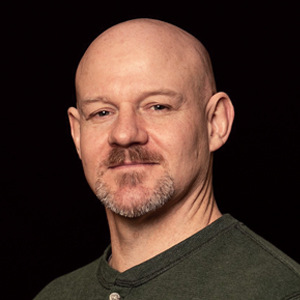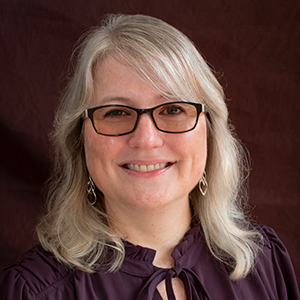The tenured itch
Graham: In 2015, I realized that being a midcareer professor at a midsized state university was less satisfying than I had imagined. The research was fine (though my flow of new ideas was tapering off), and teaching was enjoyable, so what was amiss? Not knowing the root of my waning interest, I set off on a misguided and ill-advised search for a solution. I vented my frustration primarily at my institution’s administration, specifically as it related to budget. They seemed to be constantly spending at the university’s periphery to buy shiny objects at the expense of core activities, so it was an easy case to make. But the truth is I was more diffusely dissatisfied and needed to fashion a solution to that ailment. Compounding my predicament was the fact that I had no clue that was where I should direct my energy.
Audrey: Tenured, full professor: My career was set. Except … I was nearing the end of my first major federally funded project and running out of ideas for renewal. With increased responsibilities, I found it harder and harder to settle down to think and write, and I was aggravated by increased pressure from the university to do more with less. I became an advocate, speaking out against a proposal to fund a football stadium renovation instead of a new biology building (the old one, incidentally, was obsolete before the genetic code was determined), and I fought the constant musical chairs of an upper administration that implemented new policies without considering long-term effects and without staying long enough to clean up the mess they made. At times, this was all-consuming — but only mildly satisfying. I had caught the tenured itch.
When faculty members are academically healthy, their successes emanate from their institutions in the form of scholarly works. They amass small accomplishments into profound achievements, spurred by a work ethic founded in imagination, focus and will.
However, we all have colleagues who, while clearly intelligent and insightful, have lost traction in their careers and grown restless. It can happen to any of us. Myriad events can exhaust our inspiration, but waning stimulation caused by overfamiliarity with our academic niche is at the forefront. If we don’t recognize our ennui, we can’t formulate a viable remedy.
Such a state of mind can occur any time after tenure, but it often comes in the second decade with an academic employer. Faculty members develop an invasive, pervasive and futile thought process that undermines productivity. They feel a vague desire to do something else. Many become mired in what has been called “midcareer malaise,” trying to justify their dissatisfaction. Once-engaged scholars redirect their obsessional natures in nonproductive ways. They suddenly feel unrecognized by their institutions and frustrated with administrative policy, or they cultivate animosity toward colleagues, both personal and professional.
These academics may convince themselves that their institutions do not understand their talent or value their hard work. It is true that university faculty are costly assets in a competitive job market, and administrators often struggle to quantify scholarly successes, especially when they are comparing people who make diverse scholarly contributions. Annual evaluations and regular merit-based raises can provide incentive and stability to faculty ranks. But for the malaise afflicted, money is a superficial remedy.
Disaffected faculty commonly direct their ire at institutional policies. In the modern-day university, administrative and faculty objectives seem to have diverged. Faculty remain ideological and expect others to bow at the altar of their disciplines. Administrators focus on undergraduates and often appear uninterested in scholarly activity. Railing against the administration can seem like a noble calling, but without an understanding of the university’s regulatory landscape, it may be ineptly directed. Moreover, such tilting at windmills is unlikely to yield results before it becomes all-consuming. Creative energy is finite, and a crusade to change policy comes at the expense of other accomplishments.
Some midcareer faculty vent their frustrations toward their own academic departments in petty squabbles and vendettas over space, access to department resources and perceived slights.
When a person flails about in reaction to a desire to be stimulated, inspired and driven by purpose, any and all the above behaviors may result.
If you see yourself in any of these scenarios, some part of you probably is wondering how to escape. The only path toward a cure is recognizing the malady. Selecting a remedy requires introspection and bravery.
Here are some suggestions:
- Renewed scholarship. Learn new skills that apply to your academic passion. Or develop a new research focus for which you already have the appropriate skills to alleviate the boredom that has caused the slump.
- A change in venue. The grass might not be greener at another institution, but a new location and new colleagues can stimulate you to regather your scholarly mojo.
- Increase service and/or instructional duties. A change of emphasis can be both valued and rewarding.
- Change from the inside. Instead of opposing policy as just another faculty malcontent, join the administration. An activist faculty member, with the right mentoring, makes an outstanding administrator.
- A courageous career shift. We all have many desirable skills: leadership, public speaking, problem solving and critical thinking, not to mention discipline-specific skills. Faculty can get into the rut of thinking their established career stretches off to the horizon. If that path no longer inspires, consider forging a path outside the academy.
So what steps did we take to shake our malaise?
Graham: Fast forward four years: I’m in a new research-intensive position at Loyola University Chicago and have enjoyed every minute since arriving. I am now a more agreeable individual. The research is flowing and all-consuming. I am happy to be absorbed in experimental subroutines and executing experiments with my lab members. I see projects and objectives laid out in front of me. Overall, I found the precise salve for my ills: I required new surroundings and stimuli. It was a bold step, but I am convinced completely it was the correct response to the state I was in.
Audrey: I cured my malaise in two ways. First, Graham and I started new collaborative projects far removed from my previous work (new enzyme systems! new methods!) that provided fresh inspiration. Second, I took an interim dean position. While I seem to be a capable administrator (time will tell how history views my legacy), I am now certain that what gets me up in the morning is figuring out how enzymes work. I look forward to handing the dean role off to my successor and returning to my lab to work on opine metallophore and riboflavin biosynthesis — and maybe a third new project in the works.
In closing, the window of time to reset or re-establish a career trajectory, in whatever form, is finite. Faculty members must act while they are marketable and known within their discipline. And they must not yet have adopted a disaffected mindset as the new normal.
A career driven and sustained by purpose requires honest introspection. Discovering that one is no longer fulfilled by the work has tremendous value. Without this knowledge, a faculty member may well be relegated to a purgatory of their own making.
Enjoy reading ASBMB Today?
Become a member to receive the print edition four times a year and the digital edition monthly.
Learn moreFeatured jobs
from the ASBMB career center
Get the latest from ASBMB Today
Enter your email address, and we’ll send you a weekly email with recent articles, interviews and more.
Latest in Careers
Careers highlights or most popular articles

Upcoming opportunities
ASBMB's PROLAB award helps graduate students and postdoctoral fellows spend up to six months in U.S. or Canadian labs.

From humble beginnings to unlocking lysosomal secrets
Monther Abu–Remaileh will receive the ASBMB’s 2026 Walter A. Shaw Young Investigator Award in Lipid Research at the ASBMB Annual Meeting, March 7-10 in Washington, D.C.

Chemistry meets biology to thwart parasites
Margaret Phillips will receive the Alice and C. C. Wang Award in Molecular Parasitology at the ASBMB Annual Meeting, March 7-10 in Washington, D.C.

Decoding how bacteria flip host’s molecular switches
Kim Orth will receive the Earl and Thressa Stadtman Distinguished Scientists Award at the ASBMB Annual Meeting, March 7–10, just outside of Washington, D.C.

Defining JNKs: Targets for drug discovery
Roger Davis will receive the Bert and Natalie Vallee Award in Biomedical Science at the ASBMB Annual Meeting, March 7–10, just outside of Washington, D.C.

Upcoming opportunities
No matter where you are in your career and what future path you aspire to, everyone needs leadership skills. Join ASBMB for practical strategies for building and practicing leadership skills.


